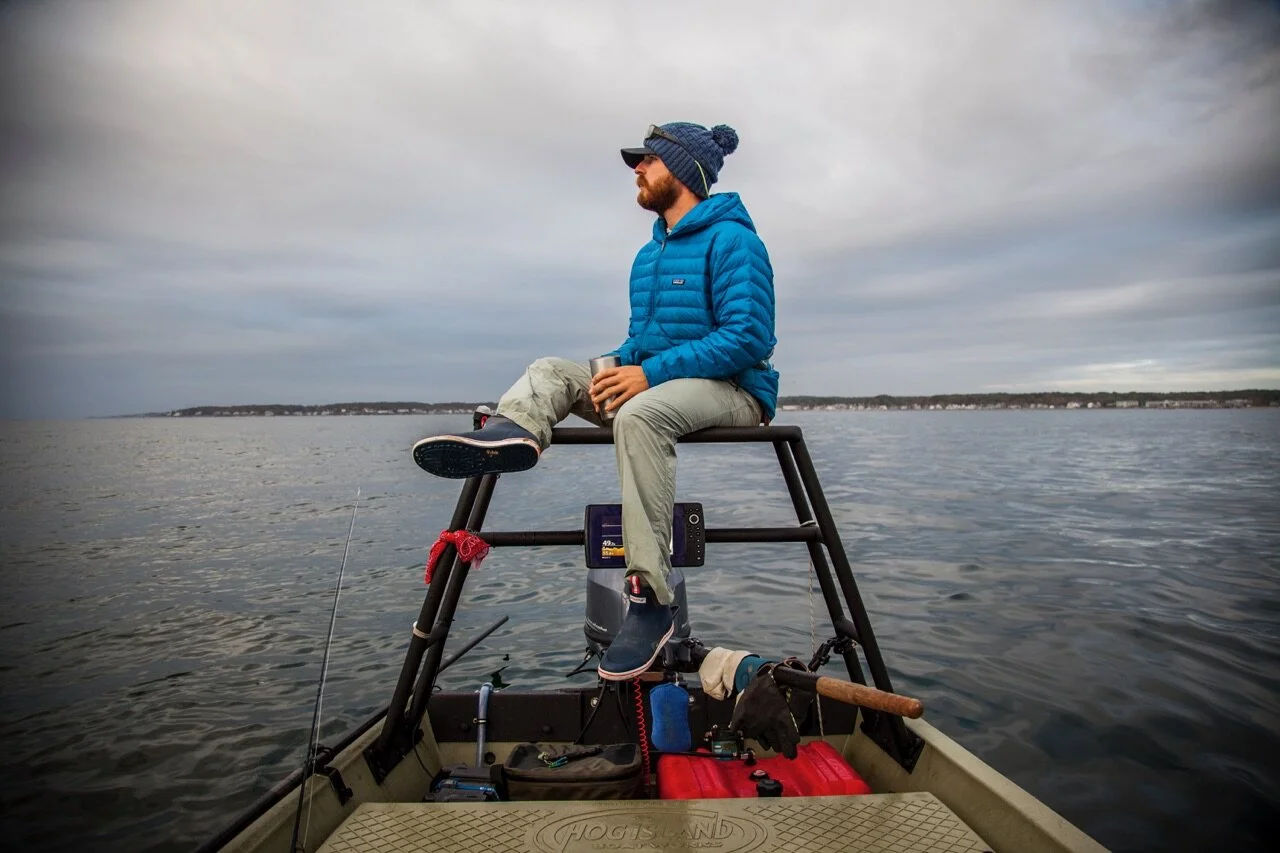Climate Change & The Gulf Of Maine
It is my opinion, which is supported by extensive science, that climate change is the single greatest threat to humanity not to mention our healthy stocks of fish all over the planet. Our world is changing and we are seeing, firsthand, the devastating consequences of our fossil fuel dependency and the result of other GHG emissions. The alarm has been ringing for years and meanwhile the west burns, air temperature continues to rise, and weather events intensify. The ranges of marine fish are shifting and our fisheries managers are having trouble keeping up.
Late fall, looking for bass, probably deep in thought. Photo: @beershower // Vedo
Chief Scientific Officer, Dr. Andrew Pershing of the Gulf of Maine Research Institute recently released his “2020 Gulf of Maine Warming Update”. The report shows findings that we’d all expect, except for the fact that the geography of the gulf of Maine has our home waters warming at a rate of 99% faster than the rest of the world’s oceans. A couple facts that stand out from Dr. Pershing’s report follow:
Since 2010, the temperature in the Gulf of Maine has been above average 92% of the time.
Over the past 10 years the Gulf of Maine has experienced heatwave conditions 55% of the time.
The Belly of the Beast, The Mighty Gulf of Maine. Photo: Dylan Schmitz
It’s all happening right under our noses. I’ve noticed small changes in striped bass movements including finding fish later in the season. I’ve also watched other species slide into our waters like Black Sea Bass and Atlantic Bonito. Lobsters are also marching north towards Canadian waters. This northern creep of these delicious creatures has a huge financial impact for Mainers. In 2018, the Maine lobster catch was valued at 484.5 million, an industry that Maine is so well known for. This season in late June I was poling a sandy flat with my client sight fishing for striped bass. I’ve poled this flat many times and we’ll typically see some young flounder and of course, our target, striped bass cruising along in shallow water feeding on crabs, shrimp and small baitfish. I had to check myself when 6 full sized Bonito came tearing onto the flat at 30 miles an hour. Not the target we were expecting that day but a real life effect of climate change and fish adapting to warming coastal waters. Make no mistake, new fish on our coast is not something to celebrate. These fish are the canaries in the coal mine, chirping as loud as they can. I lay awake at night knowing my livelihood is at risk. Ultimately, I’ll adapt and I hope our fisheries and the planet we live on can adapt and repair too.
An old, rusty fishing fleet on the coast of Rhode Island. Photo: Kyle Schaefer
Yes, this is a depressing topic and it’s hard to find a way to sugar coat it. In fact, we are far past the point of sprinkling a little glitter on this one. We are at an all-hands-on-deck moment and together we can make a serious impact. For one we need to support political candidates that care about climate change and vow to protect the planet we live on. We can vote with our dollars and support small farms, and sustainable businesses, diverting money away from big business and bad actors(which are not necessarily one and the same). I will add that voting with your dollar is often a privilege and much more challenging to do so from a position of scarcity. Yes, I have joined the Fly Fishing Climate Alliance and I have vowed to reduce and offset my carbon footprint but that is not enough. We need big businesses to catch on, renewables need to continue being more accessible, electric public transportation must flourish and hopefully systemic change can help halt years and years of frivolous carbon emissions. There is change in the air. Our planet has never been more aware about climate change and we must not let up. We’ve all seen the consequences of a rapidly warming planet. I encourage you to share your story with me, what you’ve seen, and how you feel. Let’s continue to talk about this and more importantly act. It’s in our DNA to survive and that’s exactly what we’ll do.


